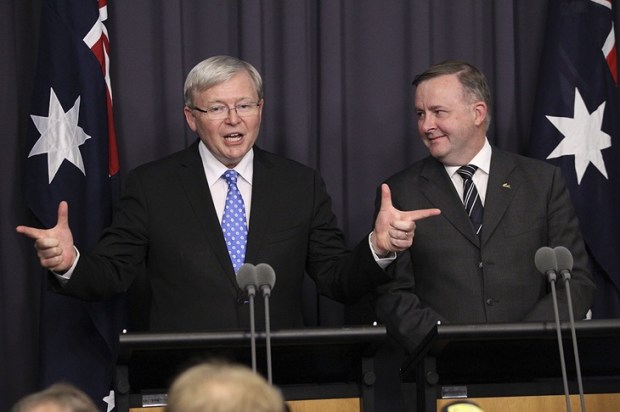In doggedly resisting US prompts to boost defence spending by evoking a ‘neutralist’ foreign policy in his recent John Curtin oration, and topping that with a five-day China trip to rapidly expand Australia-China trade, Prime Minister Anthony Albanese risks appeasing Beijing while undermining Australia’s alliance with the United States.
This threatens the Aukus nuclear-powered submarine deal.
On July 5, Albanese’s Curtin speech gave a distorted history of Australia in the second world war to justify taking an independent position on defence and foreign policy.
Albanese described the war-era Prime Minister John Curtin as ‘pushing back against two of the most powerful men in the world’, Franklin D. Roosevelt and Winston Churchill. He cited Curtin as saying that Australia ‘had never followed the flags of other lands’, he quoted Paul Keating where ‘Curtin began us thinking in our own terms’, and asserted that Australians would be ‘choosing our own way’.
Curtin did defy Churchill and Roosevelt to bring Australian troops home from the Middle East, but not to alone engage in the war with Japan. Rather, as explained by Peter Jennings from Strategic Analysis Australia, Curtin ‘understood, in a way Albanese doesn’t, that US air and naval power determined the fate of the Pacific War’.
In bringing the troops home, Curtin’s purpose was ‘to gear the Australian economy and our limited ports and airfields to support the US effort’ to defeat the Japanese imperial forces:
‘Curtin tried to do what every Australian government has done since: shape American strategic policy to suit Australian interests.’
‘Curtin moved mountains to keep first Britain, then the US, involved in Australian security,’ as The Australian’s foreign editor, Greg Sheridan, notes.
Albanese’s Curtin speech carried no urgency in relation to the war in Ukraine, or the hostile axis of Russia, Iran, North Korea, and Beijing, or Beijing’s military push into the South China Sea, its war games aimed at an invasion of Taiwan, endless air and sea confrontations with its neighbours, or Beijing’s warships conducting live-fire exercises in the Tasman Sea while circumnavigating Australia.
All this was reduced to Australians living ‘in times of profound change in our region and against the backdrop of global uncertainty’.
Risking Aukus
With Albanese in China, Pentagon policy chief Elbridge Colby used interviews and posts on X to ask Albanese the embarrassing question: Will Australia commit to deploying any future Aukus submarines in combat in support of Taiwan?
A concerned US President Donald Trump has been ‘urging allies to step up their defence spending and other efforts related to our collective defence’. Colby noted that while Nato has ‘led the way … some among our allies might not welcome frank conversations’.
Albanese is right in not committing in advance to waging war in a hypothetical contingency. The US doesn’t make such pronouncements and its policy on Taiwan is ‘strategic ambiguity’.
However, the question comes from the man – that is, Colby – who is also in charge of the US Administration’s review of the Aukus deal, and at a time when there is growing annoyance toward Australia in Washington.
Under the Aukus agreement, in 2031 the US President can decide whether it’s militarily prudent to sell such subs to Australia. He could say ‘no’ and not be in breach of the agreement.
Given Canberra’s National Audit Office report on the Navy’s inability to maintain its landing helicopter dock ship in reliable service, and Albanese’s refusal to significantly lift defence expenditure, and his government’s opposition to a complementary civilian nuclear energy industry, undoubtedly the Americans are asking the question:
Can Australia run and maintain nuclear-powered submarines?
In contrast, Nato’s 32 members are turbocharging their defence spending to 5 per cent of their combined $A27.4 trillion economy. About 3.5 per cent is for core defence spending (submarines, ships, fighter jets, weapons) and 1.5 per cent is for defence-related investment.
Then, on July 9, without mentioning Beijing, the European Union disclosed plans to boost the chemicals industry, a medical countermeasures strategy, and an essential goods stockpiling strategy – all designed to make Europe more self-reliant against threats to crucial supply chains.
The European Union also plans to ramp up domestic manufacturing, prioritise local supplies over cheaper imports, and tighten import controls and quality checks.
Both are part of a broader EU agenda to de-risk from China.
Further, following these Nato commitments and what President Trump called ‘meaningless’ talks with Russian President Vladimir Putin, the US is considering much greater military support for Ukraine.
Australia must learn from Nato. Rather than lecture the United States about Australia’s independence and anaemic neutrality, instead give a lead to middle-power democracies:
- Expand soft diplomacy with our regional neighbours, especially Pacific microstates.
- Double defence expenditure.
- Reforge ANZUS, and Australia’s loose bilateral defence arrangements with regional neighbours, into an Indo-Pacific deterrence pact like Nato.
- And vitally, instead of trying to expand trade with China, double Australian manufacturing and diversify trade to de-risk from Beijing and to build economic resilience from economic blackmail threats, which Beijing has already used in the recent past to intimidate Australia.
There is a final irony in federal government’s complacency on defence and national economic resilience…
The European Commission’s crisis management head, Hadja Lahbib, has advised Europe’s 450 million residents to pack a 72-hour survival bag, as the bloc dramatically increases defence expenditure and braces for threats ‘more complex than ever’.
According to Lucy Easthope, a professor of risk and hazard at the University of Durham, Europe’s plan is directly borrowed from the experiences of Australians living in regional communities that are prone to bushfires or flooding.
So, while Europe is basing its survival manuals on Australian manuals – like those produced by the Australian Red Cross, the NSW, South Australian, and Queensland governments – there are no Albanese government plans to issue crisis survival manuals all Australian citizens.
Patrick J. Byrne is a former national president of the National Civic Council.

























